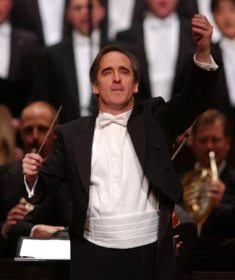
"Slava" to the 2010 May Festival
"The 2010 Cincinnati May Festival is history. “To the strains of “Hallelujah” from Handel's
“Messiah,” the 89th festival joined its predecessors in the May
Festival book of annals Saturday night (May 22) at Music Hall. (The
formerly biennial festival, founded in 1873, became an annual event in 1967.)

Music director James Conlon led the 125-voice May Festival Chorus, Cincinnati Symphony Orchestra and a cast of outstanding vocal soloists in an all-Russian program comprising Rachmaninoff's one-act opera "Aleko," the Prologue and Coronation Scene from Mussorgsky's "Boris Godunov" and the "1812" Overture by Tchaikovsky.
Tradition and panoply were all in place. Four herald trumpeters sent fanfares into the Over-the-Rhine neighborhood from the balcony above the entrance to the hall, mirroring the custom at the Festspielhaus in Bayreuth, Germany, home of the Richard Wagner Festival (younger than the May Festival by three years, by the way).
Tiny flower girls in white dresses presented bouquets to the performers, curtsies and all – and in one delightful instance, skipping into the wings afterward.
The 3,500-seat hall was packed, though not sold out (vain hope of almost everyone who performs there these days). There were flowers and champagne, and audience members received carnations as they left after the performance. The now-traditional “Amen” party (endowed by former May Festival Chorus members Betsy and Alex Young) took place in the beautifully renovated Music Hall Ballroom afterward.
The Festival finale also meant some introductions, including Rachmaninoff's “Aleko” (1892), and soprano Kara Shay Thomson in her May Festival debut. Cincinnati Opera fans also got a sneak peek at next month’s Hans Sachs in Wagner’s “Die Meistersinger,” bass-baritone James Johnson.
Above all, it was a demonstration of how handy Music Hall is for such events. Too big for symphony concerts and some opera, it fits May Festival perfectly, which is why, after all, it was built in 1878. There is really nothing like it anywhere, one reason why efforts to down-size or adapt it for multi-purposes have defied solution. With the long planned “revitalization” of the hall pushed back to 2013, it will be available for the World Choir Games in Cincinnati in 2012, where it will be a vital asset.
The program was tailor-made for Conlon, who not only has a penchant for Russian repertoire but is one of the world’s pre-eminent opera conductors. The scenes from "Boris Godunov" were performed in Mussorgsky's 1872 version as re-orchestrated by Dmitri Shostakovich.
Rachmaninoff wrote “Aleko” as his graduation exercise from the Moscow Conservatory when he was just 19. A kind of “son of ‘Carmen,’ it was inspired by a narrative poem, “The Gypsies,” by Alexander Pushkin, which may have inspired Georges Bizet’s opera, too. Like Bizet’s Don Jose, Aleko falls in love with a gypsy (Zemfira) and leaves his former life to join her gypsy band. Freedom, including free love, being the Romany creed, he is crushed when she throws him off for someone else and ends up killing her and her lover.
Rachmaninoff’s music is lush and romantic. (The women’s chorus at the beginning immediately recalled Borodin’s “Polovtsian Dances.”) There are several lovely arias, beginning with the Old Gypsy’s recollection of disappointed love and the inexorability of fate, sung with great sensitivity by bass James Creswell. Thomson demonstrated an opulent voice as Zemfira, matched in beauty if not size by tenor Rodrick Dixon as the Young Gypsy (Zemfira’s new lover). Johnson as Aleko sang with a warm, coaxing tone that flashed steel when called for. His Cavatina (“The whole camp sleeps”) was impassioned; his parting “O woe, O grief” was soft, short and cut off abruptly by a note of double bass pizzicato.
A reduced May Festival Chorus (about 60) brought the gypsies to life, giving them both energy and compassion. They banished Aleko softly at the end, with necessity instead of recrimination. Conlon led the showpiece Dances from “Aleko” with color and spirit.
The excerpts from “Boris Godunov” were spectacular, musically and musico-dramatically, with the May Festival Chorus as the voice of the Russian people, whether coerced by the Policeman to create a groundswell for Boris, praying for Mother Russia, or showering Boris with praise in the Coronation Scene. Baritone Ljubomir Puskaric as Schelkalov, who informs the crowd that Boris is reluctant to become czar, sang with a tenorial ring. (Is another Placido Domingo in the wings? The world's greatest tenor began as a baritone.)
Johnson prefaced the fireworks of the Coronation with a moment of deeply human reflection in Boris’ aria, “My soul is sorrowful.” The CSO and Chorus filled every crack in the hall with jubilation. Bells rang (percussionist Richard Jensen wielded two hammers against an extended frame of tubular bells while David Fishlock spun silver on the glockenspiel), brasses soared (with an extra set of trumpet and trombones in the balcony), and the Chorus sang “Glory” (" Слава" or “Slava”) to the czar.
Tchaikovsky’s “1812” is the quintessential orchestral blowout, made even more so Saturday night with the addition of the May Festival Chorus. The opening hymn was particularly touching, sung by the Chorus accompanied by four cellos and two violas. Retiring CSO percussionist Bill Platt, reigning master of the snare drum, introduced the “Marseillaise” as one of his final acts with the CSO. The brass, give or take an occasional wobble or pitch snafu, gave battle, abetted by Jensen’s bells and cannon shots overlaid via CD. As such, the shots could not be precisely synchronized with the performance, but the effect was suitably belligerent. The Chorus’ singing called to mind that patriotism – isn’t Tchaikovsky’s “1812 Overture" a July 4 staple? – knows no boundaries.
Conlon received a warm ovation from the crowd. Music director since 1979, he recently renewed his contract through 2013, which will make him the longest serving music director in May Festival history, exceeding founder Theodore Thomas by three years.